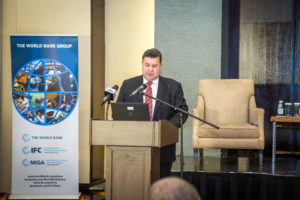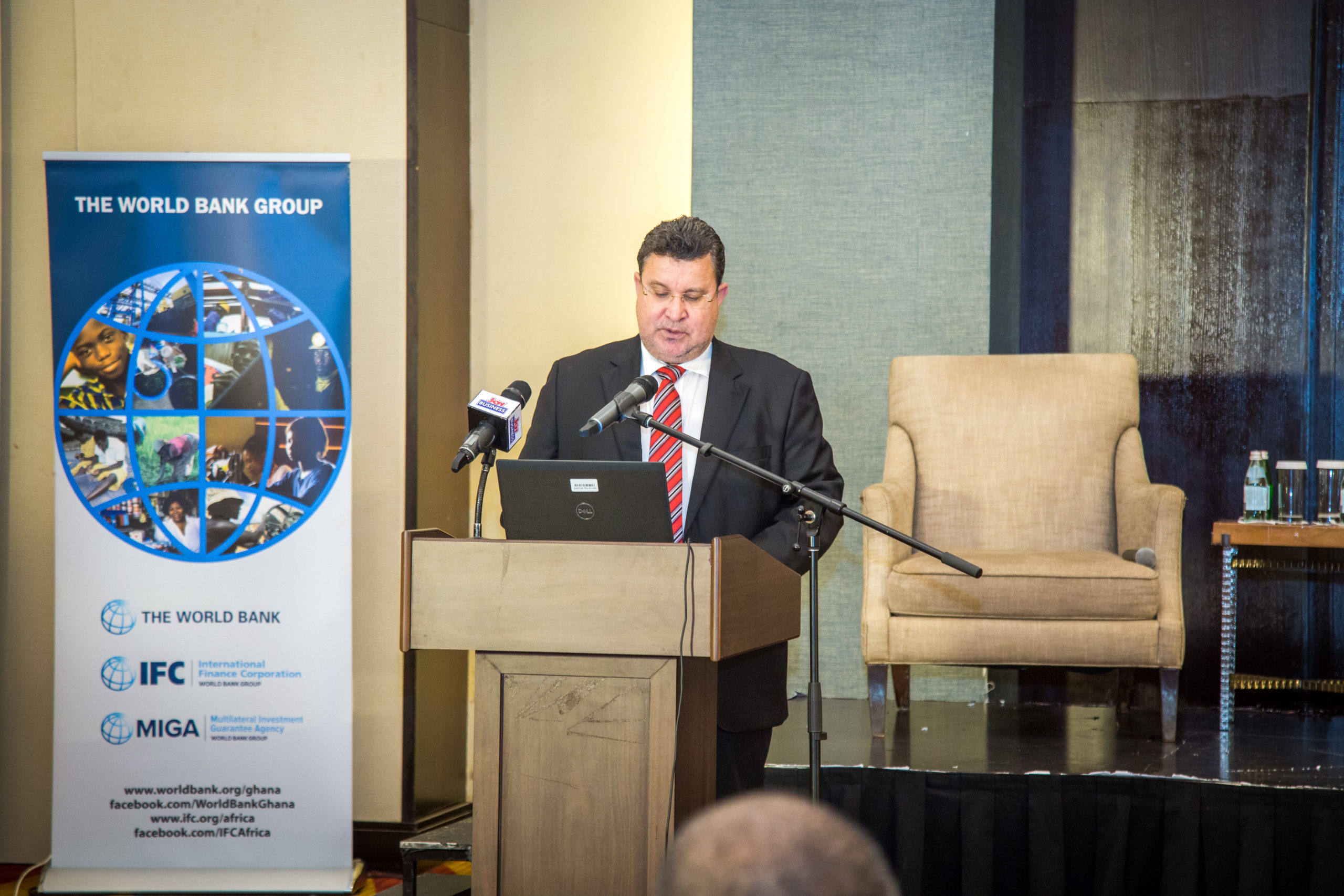
Accra, Ghana//-The Country Economic Memorandum, titled ‘Ghana Rising: Accelerating Economic Transformation and Creating Jobs’ released by the World Bank called on Ghana to fill a ‘missing middle’ of jobs in mid-productivity sectors by cultivating both manufacturing and export-oriented services in parallel.
The report which was launched on Tuesday, Wednesday 24, 2021 highlighted that the country needs to better harness the transformative potential of trade and faces an historic opportunity to do so with the African Continental Free Trade Area (AfCFTA).
“Ghana also needs to accelerate technology adoption, particularly in MSMEs and the manufacturing sector”, it added.
The report which focuses on how Ghana can accelerate economic transformation and create higher quality jobs in the coming decades, noted that the country’s
financial sector needs to provide affordable capital to firms to enable economic transformation.
Launching the report in Accra, two authors of the report, Katherine Stapleton and David Elmaleh said: “Macroeconomic management needs to play a greater role to reduce economic volatility, improve sustainability and manage natural resource wealth”.
Madam Stapleton who is also World Bank Economist, and co-author of the report, added: “Ghana faces an acute job challenge and responding to this challenge will require creating more and better job opportunities for lower- and mid-skilled workers”.
“The country’s population is projected to rise to 45 million by 2040 (according to the 2021 UN Population Forecasts), with 58 percent of the population under30 years old. This implies that around 10 million Ghanaians will enter the labor force between now and 2040, addressing the job challenge is therefore critical.”
They called on the country to increase domestic revenue mobilization and consider environmental taxation to generate revenue and enhance sustainability in key sector.
In his welcome address, the World Bank Director for Ghana, Liberia, and Sierra Leone, Pierre Laporte noted: “Digital technologies could offer a source of productivity growth and accelerate firm upgrading and spur innovation and entrepreneurship, driving growth of higher quality jobs”.
“MSMEs also provide important job opportunities for women and young people, meaning that addressing their challenges is a major way to improve inclusion.”
Commenting on the report, the Minister of Finance, Ken Ofori-Atta said the report was the true reflection of what is pertaining on the ground.
He used the occasion to urge the World Bank to support the YouStart initiative and other government priority programs to transform the economy and create jobs in the country.

The report noted that as part of the Covid-19 Alleviation and Revitalization of Enterprise Support (CARES) program, the Government of Ghana already plans to expedite digital initiatives, such as the National ID, digital address systems and land records, to digitize fiscal revenue collection as a first step toward a cashless society and improve online education delivery.
It added that though Ghana performs well on the availability of digital infrastructure – with high coverage and relatively low costs for mobile internet, fixed broadband is the main barrier to digital technology adoption.
Key recommendations
Launch sectoral and spatial transformations
- Expand lower-skilled jobs in ‘global innovator’ services, particularly ICT and business services. Focus on a) cross-cutting reforms to boost services competitiveness and b) expanding and attracting FDI into the lower-skilled segments of these services, such as BPO and IT-enabled services
- Boost competitiveness in manufacturing by fully implementing the AfCFTA. Reduce barriers to GVC participation primarily through full implementation of the AfCFTAand also improved logistics services and improved access to electricity.
- Transition to higher value-added labor-intensive tradable services in wholesale and retail, accommodation and food and transportation through FDI, attracting and cultivating large firms and developing the tourism sector after the pandemic. Improve mobility, connectivity and urban planning to enable these transitions.
Launch technological transformation
- Reduce cost and increase speeds of internet connections, particularly broadband. Accelerate mobile internet adoption through reducing costs and addressing usability barriers. Increase mobile internet speeds and reduced fixed broadband costs and expand access through regulatory reforms and government investments.
- Invest in foundational skills for all and expand advanced digital skills in tertiary education. Skills gaps need to be filled at both the bottom and top. Improve learning outcomes and the quality of education. Invest in advanced digital skills in tertiary education.
- Expand adoption of ‘Industry 3.0’ among small firms and manufacturing and ‘Industry 4.0’ in large firms. Expand the use of internet, smart phones and computers in small firms and manufacturing. Accelerate adoption of advanced technologies, such as the use of connected devices, big data, AI and smart machinery in large firms.
Leverage the financial sector
- Increase the availability of long-term finance. Accelerate the implementation of the new wholesale development bank. Develop the capital market, including through the implementation of the Capital Market Master Plan (CMMP) 2020-2029.Pursue fiscal discipline and reduce reliance on the banking sector as source of public financing to limit crowding out.
- Mitigate financial institutions’ credit risk and lessen collateral requirements. Expand partial credit guarantee facilities. Promote supply chain financing such as factoring and reverse factoring. Strengthen credit infrastructure, building on various reforms in initiated in 2020.
- Leverage technology. Digitize retail and merchant payments. Establish digital financing platforms and marketplace solutions. Encourage further digitization financial institutions’ operations to reduce operational costs.
Leverage macroeconomic stability
- Adopt a consistently counter-cyclical fiscal policy to stabilize the economy and enhance savings rates from the public sector. Reaffirm the fiscal anchor. Improve debt management. Improve transparency in the extractive sector. Increase savings.
- Strike the right balance between efficiency and equity in the tax mix while increasing revenues. Review and rationalize tax expenditures to raise revenues. Strengthen the tax administration to ensure compliance and reduce the size of the informal sector. Improve taxpayer engagement.
- Review and enhance the framework for environmental taxation to minimize the impact of climate change on households and incentivize sustainable land-use. Consolidate existing environmental taxes into one comprehensive instrument. Incentivize more sustainable cocoa farming practices
The first part asks how Ghana can launch economic transformation through global integration and technological transformation.
The second part explores how Ghana can leverage two foundational enablers of long-run inclusive productivity growth: macroeconomic stability and financial sector development.
African Eye Report


